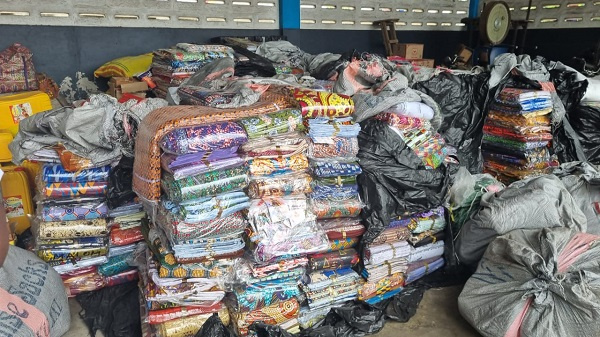The Eastern Corridor Monitoring Team of the Ghana Revenue Authority has impounded 11,200 full pieces of imitation wax prints concealed in an assorted merchandise in a 40-footer container.
Out of the 11,200 prints valued at 1.3 million cedis, the importer declared only 98 full pieces and paid a duty of 24,000 cedis on them and the assorted goods.
Briefing the media at Dabala, the officer in charge of the Eastern Corridor Monitoring Team, Senior Revenue Officer Dari Abdallah, said the concealed wax prints were discovered after the officers at the Dabala checkpoint insisted on a thorough check of the goods in the truck.
He said due to the level of sophistication of the smugglers and the various routes they had been using, the Customs officials relied on informants to get the job done.
“Normally they bring the goods in smaller quantities. Now they have loading points and used different routes, especially the Volta River,” he said.
Mr Abdallah said while the monitoring team taskforce was unloading the goods from the truck for proper examination, the owner of the goods confessed that it was wax prints concealed under the goods.
He said after the discovery the owner of the goods wanted to pay the penalty on them, but offered a lower rate than the 100 per cent Customs demanded.
The owner then decided to petition the commissioner, but a decision had been made to move the goods to Accra because of the serious nature of the infractions, he said.
Emmanuel Parker, Second in Command Aflao Collection, described as a huge challenge the influx of smuggled goods due to the vast and porous borders.
He said the Customs Officials were having a hard time at the borders trying to combat these smuggling activities.
“We are aware, they come in with small pieces and pay. But anytime we do an arrest, we realise that they would have gone to load more,” he said.
” We need logistics. We need men to come back because the borders are vast and they are porous. And when we close one side, another portion is open. And before we get to know, there would have been a lot of goods coming through,” he added.
The Ghana Revenue Authority (GRA) had earlier announced that effective October this year no textile can enter the country’s markets without an excise tax stamp embossed on it.
The decision to affix tax stamps to all imported or locally produced textiles would protect the ailing textile industry from imminent collapse.
Meanwhile, the Team has also seized 6,000 pieces of mobile phones concealed in assorted merchandise.
GNA





